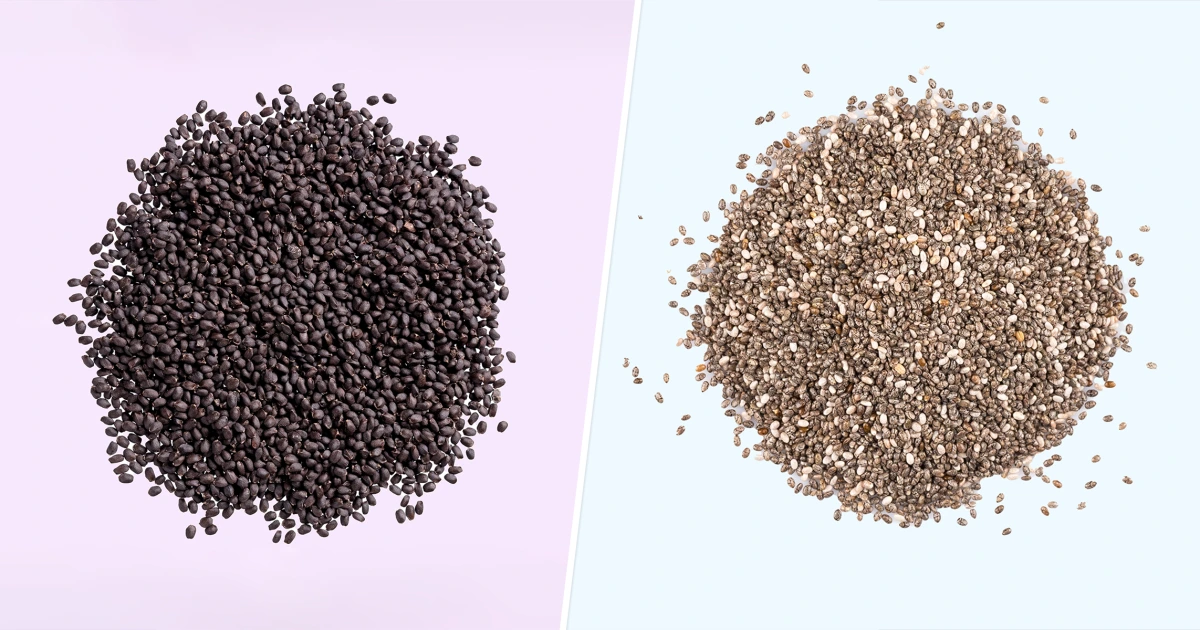
Seeds are the tiny-yet-mighty nutritional powerhouses that can add the perfect crunch to any meal. While there are plenty to choose from, some are superfood standouts, the experts say.
One that gets tons of praise is the chia seed. Super absorbent, these seeds are rich in fiber and antioxidants. It’s no wonder they made TODAY.com’s list of healthiest seeds. However, if you struggle to incorporate them into your diet, you might want a different option.
Look no further than another seed that’s becoming more popular, the lesser-known basil seed.
Like chia seeds, basil seeds are a rich source of antioxidants, Erin Palinski-Wade, registered dietitian and author, tells TODAY.com. They can also help support weight management and aid in digestion.
Both chia seeds and basil seeds are packed with vitamins, minerals and fiber with their own unique nutritional benefits. Here’s how to best incorporate them into your meals and lifestyle.
Chia Seed Nutrition
In a two-tablespoon serving of chia seeds, you’ll find:
100 calories
6 grams protein
10 grams carbohydrates
10 grams fiber
8 grams fat
Basil Seed Nutrition
In a two-tablespoon serving of basil seeds there are:
130 calories
5 grams of protein
15 grams carbohydrates
15 grams fiber
6 grams of fat
Fiber
To manage digestive health, heart health and blood sugar regulation, getting enough fiber in your diet is a must.
Basil seeds have the edge with this macronutrient. A serving of chia seeds has 10 grams, while one of basil seeds has 15. But both are great options for upping your fiber intake, registered dietitian and author Frances Largeman-Roth tells TODAY.com.
We all need 25-38 grams of fiber per day. Fiber promotes regular bowel movements and “weight management by helping to increase feelings of fullness and reducing overall calorie intake,” Palinksi-Wade says. However, most Americans don’t eat enough, “so adding in basil or chia seeds to the diet can be a great way to meet your daily goals,” or at least make a big dent, she adds.
Like chia seeds, which can hold 12 times their weight in water, basil seeds have impressive absorption powers, too. Soak your chia seeds or basil seeds in liquid to form a gel-like texture. Then, mix them into overnight puddings, smoothies and desserts.
Protein
Both chia seeds and basil seeds serve up comparable amounts of protein. From a serving of chia seeds, you’ll get 6 grams, and from basil seeds, 5 grams.
Chia seeds are unique in that they’re a complete protein, meaning they contain sufficient amounts of all nine amino acids. Basil seeds, in comparison, don’t have the amino acids lysine and methionine, Palinski-Wade points out.
However, both seeds will get you on your way to meeting your protein goals. While protein intake recommendations vary from person to person, dietitians previously told TODAY.com that everyone should aim for 20 to 40 grams of protein per meal.
Carbohydrates
Most of the carbs from chia seeds and basil seeds come from fiber, so they have less of an impact on your blood sugar than carbs from starches or sugar.
In a serving of chia seeds, you’ll find 10 grams of carbs, with most coming from fiber.
“Basil seeds can have some variation in carb content depending on (what country) they are sourced from,” but roughly contain 7-15 grams of carbs, says Palinksi-Wade, which are also mostly fiber.
Other Nutrients
You can count on a ton of nutrients when eating both basil seeds and chia seeds. Each has protein, fiber, healthy fats, vitamins and minerals.
Chia seeds are rich in calcium, magnesium, phosphorus, omega-3 fatty acids and antioxidants.
Basil seeds, on the other hand, are great sources of iron, magnesium, antioxidants and healthy fats, and offer an impressive amount of calcium — 370 milligrams per serving, even more than chia seeds, Largeman-Roth points out. Most Americans don’t get enough calcium in their diets.
Should You Eat Chia Seeds or Basil Seeds?
Whether you should opt for chia seeds or basil seeds depends on your lifestyle and your goals, the experts say.
While both are gluten-free and offer a hefty dose of fiber, protein and healthy fats, chia seeds will keep you feeling fuller and satisfied longer because, once soaked, they make a thicker gel than basil seeds. This absorption mechanism will also help keep you hydrated.
In comparison, basil seeds expand more quickly in liquid and are sometimes a lower-calorie option depending on the brand, Palinsky-Wade explains.
If calcium is what you’re after, basil seeds are your best bet. But if you’re looking for complete proteins, chia seeds are the way to go.
Regardless of which you choose, both seeds are great additions to desserts, baked goods and creamy breakfasts in which they’ll swell and deliver delicious texture.